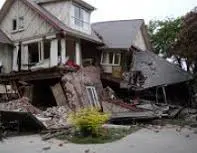The etymological origin of cataclysm is found in the Greek word kataklysmós , which can be translated as “flood” . This Greek term derived from the Latin cataclysmus , which came to our language as cataclysm.
 The first meaning mentioned in the dictionary of the Royal Spanish Academy ( RAE ) indicates that a cataclysm is a catastrophe of great magnitude that is generated by a flood or some other type of natural phenomenon. For example: “The overflow of the Regallotu River caused a cataclysm in the town” , “The eruption of the volcano was a cataclysm that left more than two thousand dead” , “In the 18th century there was an earthquake that generated a cataclysm in the city” .
The first meaning mentioned in the dictionary of the Royal Spanish Academy ( RAE ) indicates that a cataclysm is a catastrophe of great magnitude that is generated by a flood or some other type of natural phenomenon. For example: “The overflow of the Regallotu River caused a cataclysm in the town” , “The eruption of the volcano was a cataclysm that left more than two thousand dead” , “In the 18th century there was an earthquake that generated a cataclysm in the city” .
Although there are many cataclysms that have taken place throughout history, it is considered that the most important due to their magnitude or the consequences they have brought with them are some like these:
-The tsunami and earthquake that occurred in the Indian Ocean in 2004. And that underwater earthquake that originated on the coast of Sumatra reached such a magnitude that it made the earth vibrate. It killed more than 280,000 people and caused great devastation in many countries.
-The Shaanxi earthquake. In the year 1556, this cataclysm occurred in China. It is considered the one that has caused the most deaths throughout history since it resulted in the death of more than 830,000 people. It reached 8 degrees of magnitude and even affected places that were 500 kilometers from its epicenter.
-The eruption of the Toba volcano. Lake Toba, located in the aforementioned Sumatra, is where that explosive eruption occurred, which is considered the most important in the last 27 million years. Specifically, it took place about 69,000 – 77,000 years ago.
-The Great Hurricane of 1780. This cataclysm occurred this year, which is considered to be the first of its kind for which there is documentation and which brought with it the most deaths. The same event took place in Barbados, Martinique and Sint Eustatius, causing the death of some 22,000 people.
Sometimes the idea of cataclysm is used to refer to a profound change in a biotype (a region with the environmental conditions necessary for the development, subsistence and reproduction of a set of fauna and flora). It is estimated that the disappearance of the dinosaurs was due to a cataclysm possibly caused by the fall of a meteorite.
A profound upheaval of the political or social order is also called a cataclysm: “The cataclysm generated by the resignation of the president and all his ministers led to a wave of violence,” “The socialist revolution was a cataclysm for society,” “The "The recovery of democratic institutions after the cataclysm caused by the coup d'état took several years."
An event that profoundly modifies daily life , finally, can be called a cataclysm: “The death of my father when I was just a baby was a cataclysm for my family,” “The fire destroyed Gustavo's house and caused a cataclysm.” .
